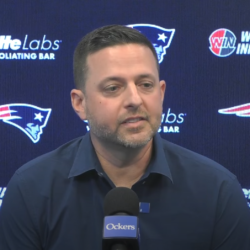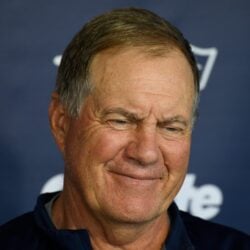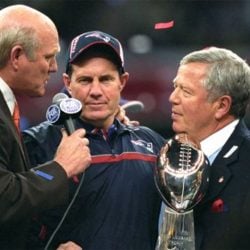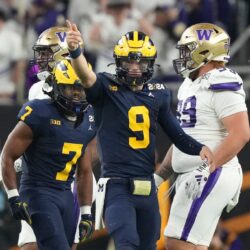Tom Brady & Bill Belichick Podcast – Full Transcript
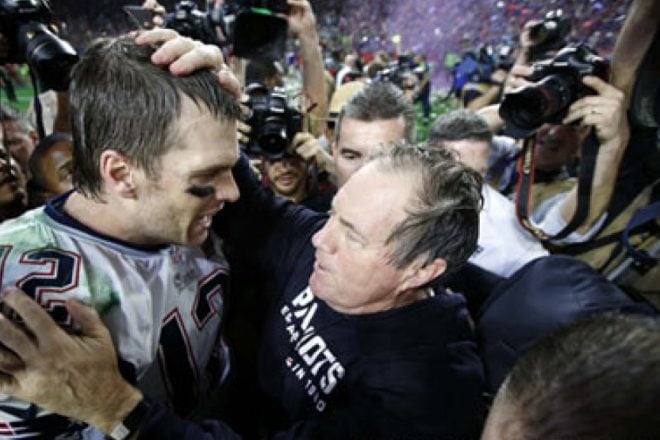
🕑 Read Time: 16 minutes
New England Patriots > Patriots Blog

If you missed Bill Belichick’s appearance recently on Tom Brady’s “Let’s Go” podcast, I took some time to transcribe it, so here’s a full transcript of the conversation.
JG: “You and Tom went to nine Super Bowls together, you celebrated six wins, 249 victories, can you believe his career is over?”
BB: “Well, you know, Tom’s had just a tremendous career. It was funny, I was out at the East-West game last weekend and of course, Tom’s picture is up there everywhere as a player in the game, along with a lot of other Hall of Famers, I think they had like 70 Hall of Famers played in that game, or something like that. But anyway, you know, that’s kind of where it all started. Michigan, the Orange Bowl, the East-West game. Just the greatest player, the greatest career, a great, great person, such an opportunity and an honor to coach Tom. I guess it’s got to end at some point but it’s the greatest one ever, so congratulations, Tom.”
TB: “Appreciate it.”
JG: “Tom, what did Bill do to bring out the best in you?”
TB: “I think it’s more what did he not do to bring out the best in me. Everyone always says … I was just very lucky. I mean I think part of it, I came into my career and got drafted by the Patriots. I always joked, you know, I had know [expletive] idea where New England was when I got drafted. I mean, I flew into Providence, which really confuses you when you’re coming from the West Coast. Because I’m like, Boston? Oh, Providence? You know, it was coach Belichick’s first year there and we came in together. I always think for so many young players, anybody can get drafted to a place. Who’s gonna turn you into something? Who’s gonna develop you? Who’s gonna take you under their wing? And sometimes it’s a player that does it and I definitely had a lot of players do that and obviously, I had someone that really saw something in me that not a lot of other people did. Yeah, there were offensive coaches and so forth, but I think coach Belichick and I developed an amazing relationship really from the moment I was drafted, but then really we spent a lot of time together.”
“He started to begin to teach me really what football was all about. How to study defenses when I started to play, certainly. We’d have weekly meetings, sometimes once, sometimes twice and I couldn’t imagine a better teacher to say, ‘Hey, this is how you’re going to play quarterback in the NFL.’ And this is … the nuances of the game. And not only that, but I just – from his leadership, which is really one of his great, great, qualities, he showed up every day with a purpose. There was, when he always joked ‘no days off’, he meant it. There was his ability to sustain even what he’s still doing, 23 years with the Patriots, beyond that, so many years in the NFL. But he’s in there working in the office right now. He’s not out there golfing. I’m sure he has his moments for those things, but they’re a lot fewer than what he could be doing. You look at his stature and who he is, and what his level of performance has been over a long period of time, he could be retired years ago. The reality is, he loves the sport, he loves teaching, he loves coaching, he loves competing, and nobody’s done it better than him. And I think what a blessing for me. There’s no way I have the success that I’ve had personally without him, and I’m very grateful for that.”
JG: What did you see in him, Bill? What did you see in him that others didn’t when he got that ball when Drew Bledsoe went out, or perhaps before in training camp?
BB: “I think it kind of started his senior year when Tom would start every game and Michigan do pretty good, and then [Drew] Henson would come in and things usually didn’t go so good. And then they’d bring Tom back at the end and they won most of their games. And then he had a great Orange Bowl game against Alabama. Just based on the opportunity that he had and the way he played well in big games at big moments and kind of, you could see the upswing, the potential, that he had, that’s kind of where he started. And then, his rookie year, you know, Tom didn’t play much, three snaps or whatever it was, but he took leadership over that rookie class and we had like 22 rookies and first-year players that year and he would keep them out after practice. They’d run plays, he knew what everybody was supposed to do. So if somebody made a mistake on the play – it wasn’t run by the coaches, it was run by Tom – and you could see the leadership that he captured with the team just in those sessions among his peers, which at that time were rookies and first-year players.”
“And then, after the first season, I brought in Damon Huard because I felt like I wanted to have an experienced backup quarterback and Tom beat him out in preseason. So Tom was the backup quarterback. And then when Drew got hurt, then it was really pretty much history until the St. Louis game, the Rams game, and that was the game where prior to that week, I split reps between Tom and Drew, but Tom played the whole game and I just felt like after the game, that I just couldn’t do that. I had to give the starting quarterback the majority of the reps, and that it would just be hard to play well with only getting half the snaps. So at that point, I made Tom the starting quarterback. That’s the smartest decision I ever made, maybe other than drafting him.”
“And then it just got better from there. Tom talks about how much I taught him in those meetings but I learned so much from Tom because I never played quarterback, and I never saw the game through the quarterback’s eyes. I saw it through a coach’s eyes. And when Tom would tell me what he saw and how he saw it, it was incredible. During the game, he’d come off and I’d say, ‘What happened on that play?’ and he’d go through eight things that happened. ‘Tackle flashed in front of me, this guy slipped, I saw the linebacker drop wide, safety was a little deeper than I thought he’d be, and then this guy stepped in front, I kind of put it a little bit behind him because I saw this other guy closing.'”
“And then you go back and look at the film, and every one of those things happened in the exact sequence that he explained it to you on the field coming off. I’m like, ‘this guy sees everything. He sees the rush, he sees the coverage, he sees the routes, he sees the depths, and he sees a lot of things presnap. And when we had the meetings that Tom referred to, we would go over fundamentals, we’d go over game plans, we’d go over situational football, watch other teams play through situations, and I remember so many situations that came up in games where Tom would refer back to, ‘Yeah, that’s what we talked about a few weeks ago when we watched the Detroit/Atlanta game’ or ‘Yeah, remember when they ran this play in this situation two years ago?’ I mean, the memory and the capacity that Tom had to remember play situations and finer points like hard counts and getting out-of-bounds plays and things like that from years before in the exact same situation and timeframe was remarkable.”
“You know, we all have decent memories, but to be able to process it that quickly in a matter of literally seconds and split seconds on the field or during a timeout or going back on the field with however much time is left … ‘Yeah, this is what we talked about. This is that situation we had in training camp. We had 0:39 and the ball was at midfield.’ … So those are the things that I learned from Tom as a quarterback was how to see the game as a quarterback instead of as a coach. Tom would say, ‘You know, I can’t see that, I’m not really looking at that.’ Like, O.K., well I’m going to stop coaching that then. Because if you can’t see it, nobody else is going to see it, so let’s see how you see the game and let me learn from you. And Tom was great about that. We had a really good relationship, especially in the film room and talking football and all that, that I’ll always treasure, and I learned so much from. Because nobody sees the game better than Tom Brady sees it or saw it and I was so lucky to learn from him and his vision, no other coach will get that experience because it was, I mean, it was incredible.”
JG: So, Tom, as time goes on, you guys become tied together. You can’t say Brady without thinking Belichick. You can’t say Belichick without thinking Brady. And this has gone on in sports, but usually, it’s with rivals. Usually, it’s Ali and Frasier, Wilt and Russell, you have it a little bit, sometimes, Kobe and Shaq, they’re teammates, sometimes you also have it, Lombardi and Starr, but when your name becomes so tied to your duo, your partner, what’s that like? What’s that like for you and also for you, coach Belichick, that you guys are now intertwined so much because of your accomplishment, your excellence, and your achievement, and the goals that you obtained will never be duplicated?
TB: “I think for me, there’s nobody I’d rather be associated with. And I think that, from my standpoint, I think it’s always such a stupid conversation to say, you know, ‘Brady vs Belichick’ because in my mind, that’s not what partnerships are about. Coach couldn’t play quarterback and I couldn’t coach. And I think the best part about football is, and coach says it a lot, ‘Do your job,’ and he asked me to play quarterback, he didn’t ask me to coach. You know, I didn’t want him playing quarterback, I just wanted him to coach. I had seen him throw, so he definitely wasn’t playing quarterback. I think it’s such a stupid, in my view, it was just people always trying to pull us apart and I don’t think we ever even felt that with each other. We never were trying to pull each other apart. We actually were always trying to go in the same direction. And I think when we were in New England for 20-years together, they get tired of writing the same story. Once they write all the nice things and championships and this, and then they just start going, ‘Well this works, let’s try starting to divide them.’ And I think I never really appreciated those ways that people would try to do that.”
“He and I always had a great relationship and we met all the time. Did we always see everything exactly the same way? Who does in life? What close relationship can you have where everything goes like a bright sunny day? No, there are moments that … you know, it was never intolerable. I mean, but it was always just, I would say, healthy debates about certain things, and we always talked about them face to face and I think there’s one thing I appreciate about coach Belichick in life is he’s not afraid to have a hard conversation too. And we didn’t always agree, but we always respected each other. I know he respected me for the job that I did, and I certainly did the same. And I think even when you go away from each other, you respect each other probably that much more, I certainly did. Because I realize the commitment that he was trying to make to get our team to win. And that’s the purpose of sports is to try to go compete and win. And when you have someone that believes in winning as much as you do, you want to be a part of that. And when people try to get in the way of that, they become the enemy. So I always think the people that tried to drive us apart actually brought us closer together.”
BB: “You know, for me, I’ve always said this, Tom’s heard it every year time after time, players win games. Players win games. You can’t win games without great players, and coaches can lose them. And if coaches don’t give the players a good opportunity to give them a chance where they can have a fair fight and can win on their ability, then great players can’t overcome bad coaching. So I always tried my best to put the team in position to win. Look, that could be 13-10 like it was in the snow bowl, or it could be 34-28, scoring 28 points in the second half or whatever it was in the Super Bowl. To me, my job was always, give the team a chance to win, put together a good team, and, you know, Tom was the greatest player on many, many good teams that we had. But it’s teams that win championships. And players that win championships, not coaches. Coaches keep from losing them, try to keep from losing them. You’ve got to give the players a chance to win and we had a lot of great players.”
“And I’d say the one thing about Tom, that it was always impressive is how he was the target every week, he had the bullseye on his back every week, and every week he came through and delivered. It was similar to [Lawrence] Taylor at the Giants. There’s a guy that’s targeted every week. And Tom always found a way to make his players productive. So it didn’t matter who the receiver, who the tight end was, he could understand what would make Rob [Gronkowski] more successful. What made Troy Brown more so? What could Wes Welker do? Not, what did I do with Troy that I want to do with Wes Welker, but how do I make Wes Welker successful? How do I make Randy Moss successful? Those players were all great players but they were all very different and they had different skills, and Tom could always bring out the best of their skills.”
“Others, James White, you know, running backs, or whatever the position was, Kevin Faulk, he made all those players great by understanding what their strengths were and understood how to use their strengths. Very similar to what Bill Russell talked about in terms of using the other teammates on the Celtics, how to get those guys shots, how to get those guys points. And I think of all the things that Tom was great at, which is a long, long list, his ability to make players around him better and more productive was ultimately his greatest skill. And there were times when we didn’t have great tackles, or we might have had a guy hurt on the offensive line, well then he got the ball out quicker. And those players never really, that match-up never really affected the game very much. I mean, all the years we went against Dwight Freeney, you know, a lot of blocking Dwight Freeney was getting rid of the ball before Dwight Freeney could get there. I mean, he was a hard guy to block and they had [Robert] Mathis on the other side.”
“And there were games, you know, the Carolina Super Bowl. I mean, honest to God, that’s as good of a defensive line as we’ve ever faced. And Tom got hit a lot, but he got the ball out and so it didn’t matter whether it was the line, the receivers, the tight ends, the running backs. When it was Corey Dillon and LeGarrette Blount, he helped them be more productive in their roles. And so, ultimately, again, of all the things that Tom was great at, I think that was, really his top quality was he made everybody around him better and utilized the skills that those players had and avoided the ones, maybe, they weren’t as good at.”
TB: “And I think, one thing, I just think, from coach Belichick’s standpoint, I think you could look at coach Belichick, and probably a lot of people do, ‘Oh, you know, an older coach. You know, ‘He’s so fixed,’ and ‘he comes across as so fixed.’ And the reality is, he’s very open and flexible to the changing times, the changing parts of the sport. How many times he adapted our offensive strategy with different playmakers and our defensive strategy? He was never fixed. ‘This is what we do, we just run a 3-4’, ‘we run a 4-3’, ‘we run this route,’ he’s so flexible and looking ahead – What’s happening in the college game? So that’s going to ultimately affect the pro game. And what kind of players are happening in college so I can begin to morph the incoming players to what their skill sets are? And I think all those things were such a … all things I learned from him.”
“He had been in the league a lot longer than I had when I started. But man, how can you … we started, let’s say, offensively with the Patriots, really a traditional two-back offense, and then we started to become more of a spread, three-receiver offense because we got some good players. And then we drafted a couple of tight ends that were amazing, we became a two-tight-end offense. We continued to change and adapt. And I think the one thing that sports forces you to do, certainly competitive sports, is you change and adapt every year with what your strengths and weaknesses are, but certainly what your competition is too. But you’ve got to work at it and you’ve got to be open to it. And I think that that flexibility by coach Belichick always allowed us, and me offensively, to see the game a certain way too that we could win with two tight ends, we could win with three tight ends, we could win with four receivers, all dependent … and you need all those tools throughout the season because some weeks, [expletive] your tight ends get hurt and you’ve got to go … and sometimes your receivers get hurt. And it’s just, that’s what adaptation is and I think he taught me that from the moment I walked in the door.”
“He didn’t care who was on the field, he expected us to win. There was an expectation, performance, and winning regardless of who was out there. Because, in the end, so many people want to use excuses, whether it’s in sports or in life, for, ‘This is why things didn’t go well.’ ‘Here are the myriad of excuses,’ … which ends in all bull[expletive]. Because, in the end, no one wants to hear that. They just want to hear, Did you win? Or did you lose? And we were going to find a formula for winning as often as we can and we didn’t always win, of course not. But it wasn’t in the pursuit of not trying to win, that I think, the process for us was the most enjoyable part. There was always a formula to try to win.”
JG: Coach, you know, I think what’s so interesting is listening to you guys, it just reminds me of how you treated Tommy like you treated everybody else on the team, even after you won the first, second, third Super Bowls that he rose to become a superstar in the eyes of the public but once he came into your building, he was one of those 53 and if you had to point out something, you pointed out something to him, and if you had to call him out, you called him out. Can you just kind of take us through your inner thinking on that and the wherewithal that that takes to not allow somebody to get bigger than the organization because you’re trying to win a game, and it takes everybody?
BB: “You know, really, Jim, that was as much a part of Tom as it was me because there were a couple of meetings, you know where I would say something to Tom after the meeting like, ‘Hey, you know, I didn’t really think that was that bad, but I just wanted to include you in there with everybody else.’ And Tom would say, “Coach, you have to. If you don’t yell at me, then what am I going to do with all the rest of my teammates? I’ve got to be in there with all the rest of them and say, ‘Hey, he’s yelling at all of us and, like, we all got to do better.’ But if you leave me out of it, then I don’t really have a platform to work from. So yeah, go ahead and rip my ass too. Go ahead.’ I got the green light on that, so I went ahead and took it and I remember the thing that players, they always come back to me and say, ‘Hey, that first meeting, Belichick got on Brady. I’m like, Christ, if he’s going to talk to Brady like that, like, I better be straight. I know what’s going to happen to me.’ And Tom’s acceptance of that, and also then his ability to lead his teammates by putting himself in the same boat with everybody else, ‘Yeah, we all got to do a better job. You know, he’s after me just like he’s after everybody else. Let’s go.'”
“That’s a tremendous platform to lead from and Tom recognized that. And yeah, you know, was he our best player, did he make the fewest mistakes out there and all that? Yeah, but everybody can do better. Every coach, every player, no matter how great they are. And you know if you’re really striving for perfection, then we all want that. I want to be a better coach, Tom wants to be a better player, and so does everybody else. Law wants to be a better corner, and Logan Mankings wants to be a better guard and all that, and Rob Gronkowski wants to be a better tight end, and if you can tell them something to help them be better, a real competitor will appreciate that. And I actually, where I got that from, was coach [Bobby] Knight, because Coach Knight told me that’s what he did with Michael Jordan on the Olympic team. He said, ‘You know, Michael, I’m going to rip your ass because I can’t rip some of these other guys without ripping you,’ and Jordan said, ‘Hey, bring it on because I need that, and that will help me with my teammates.’ And it was kind of a similar thing with Tom. He told me he appreciated it. I don’t if that’s really true or not, be he told me he appreciated it.”
JG: Coach, do you have any advice for Tom as he goes forward now? You’ve seen, literally, a thousand guys retire, they’re going full speed a million miles a minute, and then all of a sudden, they don’t have football anymore. You’ve played golf with Tom, you had that round at Pebble Beach, so you know what he’s like on the golf course and whether that will satisfy him or not, but any advice for him?
BB: “So Tom and I played together for three days in the Pro-Am out there and I think, if I could sum up Tom Brady in one picture, it would be on the sixth hole where he drove the ball to the right, it looked like it was going to be, you know, I mean, it looked like he was over the cliff, right? When he teed off, I think it was way to the right, and when we get down there, and he’s standing over the cliff, and he’s like, ‘I think I see it.’ And he takes his club down there and he climbs over the cliff, I can only see like from about his shoulders up. Now, it’s 200 feet down into the rocks, and there’s no way he survives this fall, and I’m looking at the greatest quarterback, our star player, I mean, Tom Brady’s standing there literally on a Goddamn ledge, hitting a ball off the ledge up the hill to the sixth green. And I’m thinking to myself, ‘I mean, like this is Tom Brady. Like number one, super competitor, he’s trying to hit this impossible shot, comes pretty close to honestly dying, and landing in the Goddamn rock 200 feet below, all in the name of competition and being the best he can be and taking whatever the situation is, wherever the ball lands and playing it and hitting the next good shot. And I was like, man, when I saw him climb over the hill back on there, I’m like, ‘Just take the two-stroke penalty, Man. Play the pro’s ball.”
TB: “[Laughing] That’s what I should have done.”
JG: So I guess you would advise him not to get too close to the cliff?
BB: “I was never more worried about Tom physically until I saw him standing on that ledge trying to hit, not trying to, hitting the ball up to the sixth green at Pebble, with like a 25mph wind too I mean, just to make it interesting.”
TB: “I’ve done a lot of dumb things in my life, that was probably right at the top of the list. I mean, I’ve done a lot of stupid [expletive]. I’m happy I didn’t pay the price for that one, but that could have been nasty. It won’t be a lot of golf, it’ll be actually watching a lot of football because that’s never going too far from my mind. I love the sport, I love everyone, man, that came into my life, certainly, coach Belichick was right at the top of the list. So, thanks, coach. You know how I feel about you. I love seeing you out there coaching and I think every coach in the world should watch as much of coach Belichick as you can and learn because that’s what they should do. Because if they want to see what a real coach can do, and what he’s capable of, and the consistency and dependability and the trust that you have in the people that coach you, then there’s nobody I love more than coach Belichick.”
BB: “Appreciate that, Tom.”
